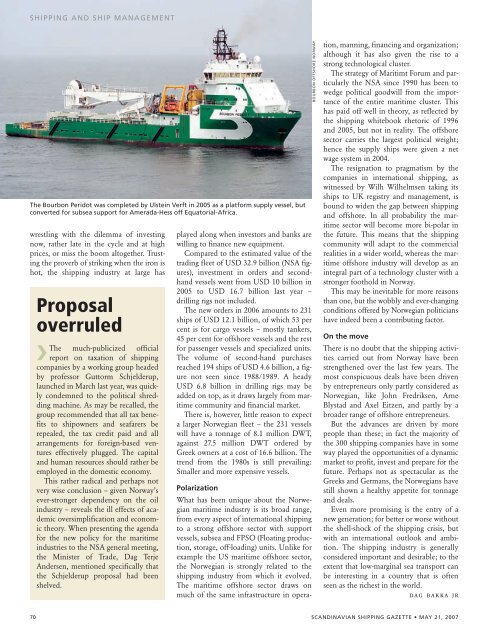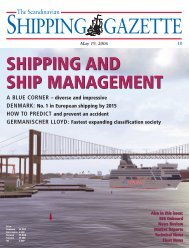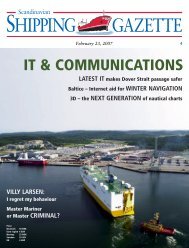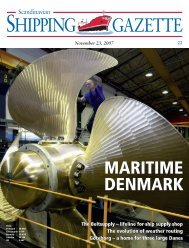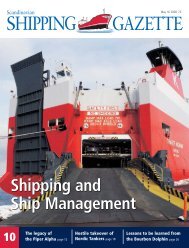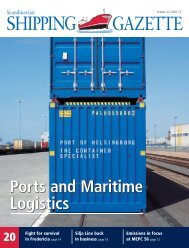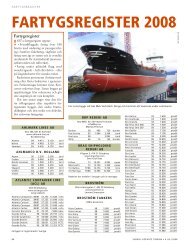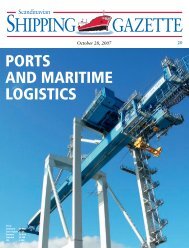SSG No 10 - Shipgaz
SSG No 10 - Shipgaz
SSG No 10 - Shipgaz
You also want an ePaper? Increase the reach of your titles
YUMPU automatically turns print PDFs into web optimized ePapers that Google loves.
SHIPPING AND SHIP MANAGEMENT<br />
The Bourbon Peridot was completed by Ulstein Verft in 2005 as a platform supply vessel, but<br />
converted for subsea support for Amerada-Hess off Equatorial-Africa.<br />
wrestling with the dilemma of investing<br />
now, rather late in the cycle and at high<br />
prices, or miss the boom altogether. Trusting<br />
the proverb of striking when the iron is<br />
hot, the shipping industry at large has<br />
Proposal<br />
overruled<br />
❯<br />
The much-publicized official<br />
report on taxation of shipping<br />
companies by a working group headed<br />
by professor Guttorm Schjelderup,<br />
launched in March last year, was quickly<br />
condemned to the political shredding<br />
machine. As may be recalled, the<br />
group recommended that all tax benefits<br />
to shipowners and seafarers be<br />
repealed, the tax credit paid and all<br />
arrangements for foreign-based ventures<br />
effectively plugged. The capital<br />
and human resources should rather be<br />
employed in the domestic economy.<br />
This rather radical and perhaps not<br />
very wise conclusion – given <strong>No</strong>rway’s<br />
ever-stronger dependency on the oil<br />
industry – reveals the ill effects of academic<br />
oversimplification and economic<br />
theory. When presenting the agenda<br />
for the new policy for the maritime<br />
industries to the NSA general meeting,<br />
the Minister of Trade, Dag Terje<br />
Andersen, mentioned specifically that<br />
the Schjelderup proposal had been<br />
shelved.<br />
played along when investors and banks are<br />
willing to finance new equipment.<br />
Compared to the estimated value of the<br />
trading fleet of USD 32.9 billion (NSA figures),<br />
investment in orders and secondhand<br />
vessels went from USD <strong>10</strong> billion in<br />
2005 to USD 16.7 billion last year –<br />
drilling rigs not included.<br />
The new orders in 2006 amounts to 231<br />
ships of USD 12.1 billion, of which 53 per<br />
cent is for cargo vessels – mostly tankers,<br />
45 per cent for offshore vessels and the rest<br />
for passenger vessels and specialized units.<br />
The volume of second-hand purchases<br />
reached 194 ships of USD 4.6 billion, a figure<br />
not seen since 1988/1989. A heady<br />
USD 6.8 billion in drilling rigs may be<br />
added on top, as it draws largely from maritime<br />
community and financial market.<br />
There is, however, little reason to expect<br />
a larger <strong>No</strong>rwegian fleet – the 231 vessels<br />
will have a tonnage of 8.1 million DWT,<br />
against 27.5 million DWT ordered by<br />
Greek owners at a cost of 16.6 billion. The<br />
trend from the 1980s is still prevailing:<br />
Smaller and more expensive vessels.<br />
Polarization<br />
What has been unique about the <strong>No</strong>rwegian<br />
maritime industry is its broad range,<br />
from every aspect of international shipping<br />
to a strong offshore sector with support<br />
vessels, subsea and FPSO (Floating production,<br />
storage, off-loading) units. Unlike for<br />
example the US maritime offshore sector,<br />
the <strong>No</strong>rwegian is strongly related to the<br />
shipping industry from which it evolved.<br />
The maritime offshore sector draws on<br />
much of the same infrastructure in opera-<br />
tion, manning, financing and organization;<br />
although it has also given the rise to a<br />
strong technological cluster.<br />
The strategy of Maritimt Forum and particularly<br />
the NSA since 1990 has been to<br />
wedge political goodwill from the importance<br />
of the entire maritime cluster. This<br />
has paid off well in theory, as reflected by<br />
the shipping whitebook rhetoric of 1996<br />
and 2005, but not in reality. The offshore<br />
sector carries the largest political weight;<br />
hence the supply ships were given a net<br />
wage system in 2004.<br />
The resignation to pragmatism by the<br />
companies in international shipping, as<br />
witnessed by Wilh Wilhelmsen taking its<br />
ships to UK registry and management, is<br />
bound to widen the gap between shipping<br />
and offshore. In all probability the maritime<br />
sector will become more bi-polar in<br />
the future. This means that the shipping<br />
community will adapt to the commercial<br />
realities in a wider world, whereas the maritime<br />
offshore industry will develop as an<br />
integral part of a technology cluster with a<br />
stronger foothold in <strong>No</strong>rway.<br />
This may be inevitable for more reasons<br />
than one, but the wobbly and ever-changing<br />
conditions offered by <strong>No</strong>rwegian politicians<br />
have indeed been a contributing factor.<br />
On the move<br />
There is no doubt that the shipping activities<br />
carried out from <strong>No</strong>rway have been<br />
strengthened over the last few years. The<br />
most conspicuous deals have been driven<br />
by entrepreneurs only partly considered as<br />
<strong>No</strong>rwegian, like John Fredriksen, Arne<br />
Blystad and Axel Eitzen, and partly by a<br />
broader range of offshore entrepreneurs.<br />
But the advances are driven by more<br />
people than these; in fact the majority of<br />
the 300 shipping companies have in some<br />
way played the opportunities of a dynamic<br />
market to profit, invest and prepare for the<br />
future. Perhaps not as spectacular as the<br />
Greeks and Germans, the <strong>No</strong>rwegians have<br />
still shown a healthy appetite for tonnage<br />
and deals.<br />
Even more promising is the entry of a<br />
new generation; for better or worse without<br />
the shell-shock of the shipping crisis, but<br />
with an international outlook and ambition.<br />
The shipping industry is generally<br />
considered important and desirable; to the<br />
extent that low-marginal sea transport can<br />
be interesting in a country that is often<br />
seen as the richest in the world.<br />
dag bakka jr<br />
70 SCANDINAVIAN SHIPPING GAZETTE • MAY 21, 2007<br />
BOURBON OFFSHORE NORWAY


